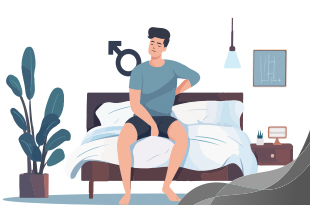Your Complete Guide to Choosing the Best Weight Loss Treatment Centers
Generally, managing obesity is often an exhausting task for many people. As people learn more and more about the value of healthy lifestyles and their benefits in their daily lives, weight loss treatment centers are seen as productive means of getting professional assistance in losing weight. These centers comprise medical supervision, diet plans, aversive behavioral therapy, and more besides fitness programs ensuring to fulfill clients’ requirements.
Here in this blog, we will be explaining the following: What are Weight Loss Treatment Centers? What is the link between men’s health and weight loss? How do they help? Types of programs available, and the importance of seeking Professional Assistance in Weight Loss.
What Are Loss Treatment Centers?
Weight loss treatment centers are unique centers whose programs focus on helping people lose weight using appropriate methods. These centers are usually staffed with doctors, dietician specialists, physiotherapists and trainers, psychologists and sometimes even surgeons who follow an integrated approach to the treatment which is decided according to an individual’s needs, goals, and medical history.
It is for people who may be overweight, people who for some medical reasons need to lose some weight, and people who may have used other methods without success.
READ MORE: Hormone Replacement Therapy and Weight Loss: What’s The Connection?
How Do Weight Loss Treatment Centers Work?
A patient diagnosis as well as the assessment of the extent of the problem is usually done during the initial interview with the weight loss treatment center. This appraisal involves laboratory investigations, general blood count, body mass index measurements, and other clinical comorbidities that may have an impact on good weight loss programs for men.

After this input has been taken, the various experts in an organization set out a plan for weight loss. This plan can include a combination of the following elements:
- Diet and Nutrition Plans: Centers offer nutritional advice together with diets that will help a person lose weight but at the same time provide all the necessary nutrients. Such plans may include keeping calorie intake certain, proper ratio of nutrients, and use of specific diets that are low-carb, low-fat, or ketogenic diets.
- Exercise Programs: Exercise is normally a major part of most diets designed to lessen the body weight of an individual. Most of the treatment centers design exercise regimes based on the capacities of the patient. This can be anything from mere jogging or cycling for the first-timers to more rigorous weight lifting.
- Medical Supervision: Whenever complications of obesity or other associated illnesses are observed, then it should be done under strict medical advice. A doctor may check the patient’s pulse rate, blood pressure, varied blood pressure, or appetite changes or propose specific treatments like prescription diet pills.
- Behavioral Therapy: There are a lot of aspects that show how psychological aspects influence appetite and fatness. Most centers are equipped with behavioral therapy as a treatment for various disorders including emotional eating, stress, and developing healthy relationships with food.
- Surgical Interventions: There exist specific procedures for individuals with severe obesity, some of these are surgeries which include bariatric surgery i.e., gastric bypass, gastric sleeve, or non-incision food procedures like gastric balloons.
Types Of Programs Offered Via Weight Loss Centers
Today, there are so many programs in weight loss centers that every plan is uniquely made depending on the client who wants to lose weight. Below are some of the most common types of programs:
- Medically Supervised Weight Loss Programs: These programs are most suitable for candidates with a BMI greater than 30 or any candidate with weight-related issues such as diabetes, hypertension, etc. In most cases they require supervision by healthcare providers and where necessary, they include feeding, exercise, drugs, or operations. This way the objective is to achieve weight loss without compromising the health aspects associated with it.
- Residential Weight Loss Programs: These programs demand that people spend their time within this center for some weeks, months, or even years. This time involves many hours of tailored encouragement, including physical exercise, proper diet, and, of course, therapy. It eradicates all the distractions and unhealthy habits that may hinder the rate of losing body weight in a targeted goal.
- Outpatient Programs: Outpatient services for weight loss allow people to come to the center for consultations, treatments, and follow-ups at their homes. Such programs are the ones that allow the individual to enroll if they cannot afford to attend a residential program but they require the support of a professional.
- Holistic Weight Loss Programs: Eco-nutrition weight reduction plans incorporate both dieting and the overall functioning of the body male weight loss program is aimed at the entire body. Such programs may involve dietary control, exercise, relaxation, massage therapy, and even religious consultations for persons with such illnesses.
- Bariatric Surgery Programs: For people with severe obesity, it may be prescribed to have bariatric surgery. They are useful for preparing a patient for surgery and for providing support after the surgery to cope with a new lifestyle. Some of the usual surgeries comprise the following aspects: the gastric bypass, the gastric sleeve, and the adjustable gastric band.
READ MORE: Does Testosterone Help Lose Weight: A Comprehensive Look At The Science
Advantages Of Weight Loss Treatment Centers
Weight loss treatment centers can have some potential benefits for individuals in need. Some of the common benefits are as follows:
- Professional Guidance and Supervision: In weight loss treatment centers, one is privileged to be attended by a team of professionals to help him/her along this program. Being well-informed and experienced they guarantee that the applied procedures are efficient, safe, and appropriate to your case. This is especially crucial to them, especially those who have other health complications within their bodies.
- Structured and Personalized Plans: Yet one of the main benefits of weight loss centers as weight loss solutions is that you get the program designed by your body type, lifestyle, and overall health. This framework is quite helpful with reaching, identifying, and sticking to long-term objectives thereby producing lasting effects.
- Comprehensive Support System: Besides medical requirements, these centers offer counseling on psychological problems such as stress, anxiety, or depression that may possibly be causing a setback in a person’s attempt to lose weight.
- Long-Term Results: Weight loss centers do not aim to bring fast results as they prefer incorporating a healthy lifestyle instead. People are taught ways on how to take relatively small portions of food, take time to chew the food, prepare, cook and take food in moderation, and take relative amounts of exercises in order to have sustainable weight loss in the long run.
- Improved Health and Well-Being: Losing weight results in a positive change in appearance and reduces the risk of serious illness. Losing some weight may decrease the dangers associated with heart disease, diabetes complications, hypertension and many others along with enhanced energy and wellbeing.
- Accountability: Meeting healthcare professionals at weight loss treatment centers means that participants are held to account for progress they are making. This accountability enhances the need of carrying out the work and enables people to overcome hurdles.
Are Weight Loss Treatment Centers An Ideal Choice For You?
Despite this, weight loss treatment centers have been showing clearly to be very effective though not for every candidate. Consider the following factors when deciding if a treatment center is the best option for you:
- Commitment: Do you want a structured discipline to lose weight or are you willing to dedicate time and make the effort?
- Medical Conditions: Are you experiencing any conditions that should make you consult a physician before you begin a diet program?
- Cost: Obesity centers are costly institutions through which people have to seek services hence making it even expensive if they are not subsidized by insurance companies. You must verify your coverage, think about whether it is worthwhile and invest in your health in the long run.
- Lifestyle Compatibility: Is the program compatible with your schedule, other commitments, and your personality? A few individuals may opt to attend outpatient programs because their situations allow them not to attend residential programs.
READ MORE: Testosterone Replacement Therapy Before and After: Is It That Effective?
Bottom Line!
Weight loss treatment centers are special facilities that provide professional medical men’s weight loss programs consisting of medical overweight management, individual nutrition plans, exercise regimes, and behavioral therapy. These are centers that assist people in their weight loss goals by offering professional help and support in achieving one’s targets of losing weight and improving their health. Outpatient services or extensive programs offered at these centers prepare people for long-term management of illness and ensure individuals do not experience recurrence of the diseases that are commonly associated with obesity. If you are looking for great weight loss treatment centers, then stress no more and get in touch with Revive Men’s Health and experience and amazing transformation today!



